形容词副词的比较级和高级
- 格式:doc
- 大小:169.00 KB
- 文档页数:8
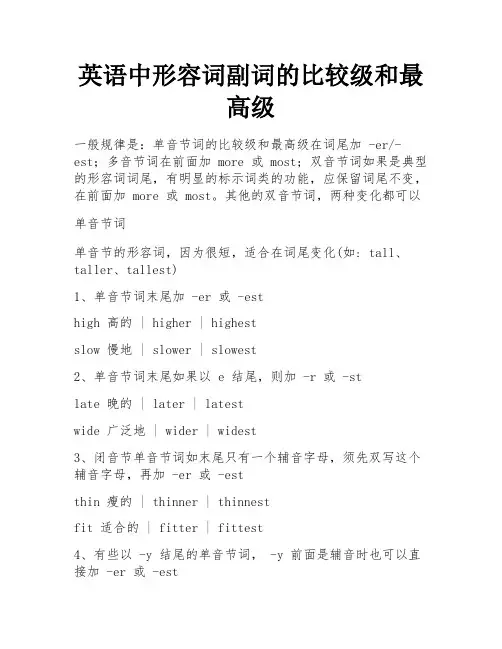
英语中形容词副词的比较级和最高级一般规律是:单音节词的比较级和最高级在词尾加 -er/-est;多音节词在前面加 more 或 most;双音节词如果是典型的形容词词尾,有明显的标示词类的功能,应保留词尾不变,在前面加 more 或 most。
其他的双音节词,两种变化都可以单音节词单音节的形容词,因为很短,适合在词尾变化(如: tall、taller、tallest)1、单音节词末尾加 -er 或 -esthigh 高的 | higher | highestslow 慢地 | slower | slowest2、单音节词末尾如果以 e 结尾,则加 -r 或 -stlate 晚的 | later | latestwide 广泛地 | wider | widest3、闭音节单音节词如末尾只有一个辅音字母,须先双写这个辅音字母,再加 -er 或 -estthin 瘦的 | thinner | thinnestfit 适合的 | fitter | fittest4、有些以 -y 结尾的单音节词, -y 前面是辅音时也可以直接加 -er 或 -estshy 害羞的 | shyer | shyestsly 狡猾的 | slyer | slyestwry 讽刺的 | wryer | wryest多音节词三个音节以上的多音节词已经很长,不适合再加词尾变化,因而在前面加 more 或 most,表示更(最)...,或者加 less 或least ,表示更(最)不...interesting 有趣的 | more interesting | most interestingimportant 重要的 | less important | least importantcarefully 认真地 | more carefully | most carefully双音节词双音节形容词很尴尬:不长不短,怎么判断?1、词尾是典型的形容词词尾,有明显的标示词类的功能,应保留词尾不变,在前面加 more 或 mostcrowded more crowded most crowdedloving more loving most lovinghelpful more helpful most helpfulfamous more famous most famousactive more active most active2、其他的双音节形容词,如果不是典型的形容词字尾,变化则无限制,两种变化都可以often oftener(more often) oftenest(most often)shallow shallower(more shallow) shallowest(most shallow)3、如果是 -y 结尾,这个长母音因为发音上的要求,要先变成短母音的 i,再加字尾变化,如:happy happier happiestlucky luckier luckiest二、不规则形式good/well | better | bestbad/ill/badly | worse | worstmany/much | more | mostlittle | less | leastfar | farther/further | farthest/furthestold | older/elder | oldest/eldest三、比较等级英语中形容词副词有三个比较等级,即原级、比较级和最高级1、原级(1) 表示程度相同,即“和...一样...”时用原级,常用"as... as" 结构It is as beautiful as paradise in Heaven. 这里如天堂般美丽This room is as broad as it is long. 那个房间长宽相等He is as handsome as John (is). 他和约翰一样英俊He studies as hard as John (does). 他和约翰一样努力(2) as...as... 引导的结构可采用倒装句型He studies as hard as John (does). = He studies as hard as does John.He is as handsome as John is. = He is as handsome as is John.(3) 否定的原级用 not as...as 或not so...as,二者区别不大You are not as tall as he. 你没有他高Guangzhou is not as clean as Shanghai. 广州没有上海那么干净I didn't do so well as I should. 我做得不如我应做得那么好(4) as/so... as... 结构前可以用 just、quite、almost、nearly、half 等词在程度上加以修饰This story was quite as interesting as we had thought. 这个故事和我们想的一样精彩The bike is not half so new as mine. 这辆自行车还没我的一半新She can read twice as fast as he does. 她的阅读速度比他快一倍John is not quite as good a student as his sister.连接词 as 表示这是组 as..as 的比较级。
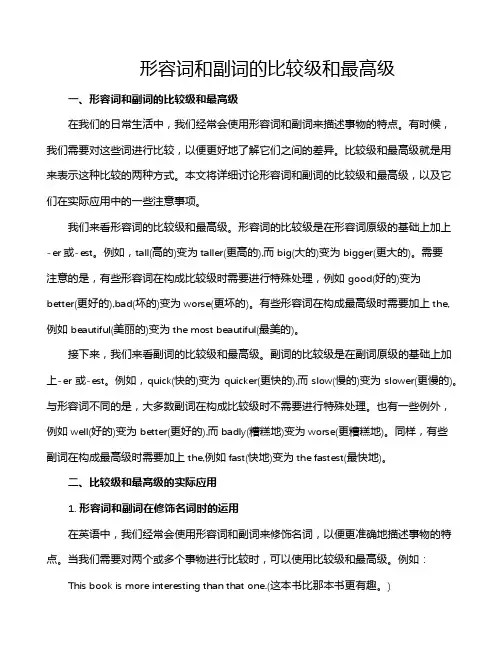
形容词和副词的比较级和最高级一、形容词和副词的比较级和最高级在我们的日常生活中,我们经常会使用形容词和副词来描述事物的特点。
有时候,我们需要对这些词进行比较,以便更好地了解它们之间的差异。
比较级和最高级就是用来表示这种比较的两种方式。
本文将详细讨论形容词和副词的比较级和最高级,以及它们在实际应用中的一些注意事项。
我们来看形容词的比较级和最高级。
形容词的比较级是在形容词原级的基础上加上-er或-est。
例如,tall(高的)变为taller(更高的),而big(大的)变为bigger(更大的)。
需要注意的是,有些形容词在构成比较级时需要进行特殊处理,例如good(好的)变为better(更好的),bad(坏的)变为worse(更坏的)。
有些形容词在构成最高级时需要加上the,例如beautiful(美丽的)变为the most beautiful(最美的)。
接下来,我们来看副词的比较级和最高级。
副词的比较级是在副词原级的基础上加上-er或-est。
例如,quick(快的)变为quicker(更快的),而slow(慢的)变为slower(更慢的)。
与形容词不同的是,大多数副词在构成比较级时不需要进行特殊处理。
也有一些例外,例如well(好的)变为better(更好的),而badly(糟糕地)变为worse(更糟糕地)。
同样,有些副词在构成最高级时需要加上the,例如fast(快地)变为the fastest(最快地)。
二、比较级和最高级的实际应用1. 形容词和副词在修饰名词时的运用在英语中,我们经常会使用形容词和副词来修饰名词,以便更准确地描述事物的特点。
当我们需要对两个或多个事物进行比较时,可以使用比较级和最高级。
例如:This book is more interesting than that one.(这本书比那本书更有趣。
)She sings the best in the choir.(她在合唱团里唱得最好。
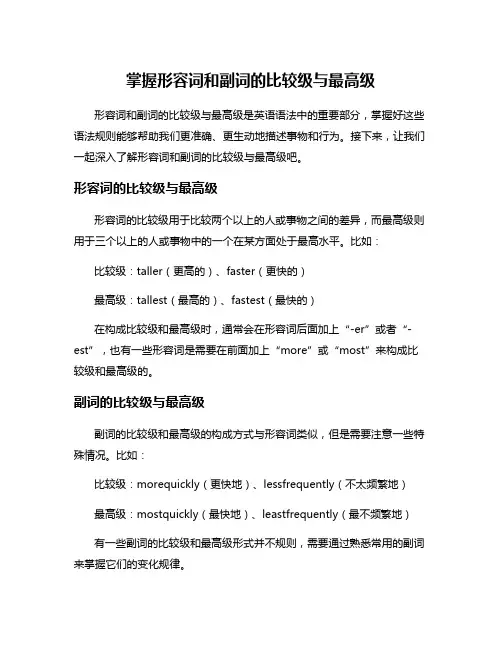
掌握形容词和副词的比较级与最高级
形容词和副词的比较级与最高级是英语语法中的重要部分,掌握好这些语法规则能够帮助我们更准确、更生动地描述事物和行为。
接下来,让我们一起深入了解形容词和副词的比较级与最高级吧。
形容词的比较级与最高级
形容词的比较级用于比较两个以上的人或事物之间的差异,而最高级则用于三个以上的人或事物中的一个在某方面处于最高水平。
比如:
比较级:taller(更高的)、faster(更快的)
最高级:tallest(最高的)、fastest(最快的)
在构成比较级和最高级时,通常会在形容词后面加上“-er”或者“-est”,也有一些形容词是需要在前面加上“more”或“most”来构成比较级和最高级的。
副词的比较级与最高级
副词的比较级和最高级的构成方式与形容词类似,但是需要注意一些特殊情况。
比如:
比较级:morequickly(更快地)、lessfrequently(不太频繁地)
最高级:mostquickly(最快地)、leastfrequently(最不频繁地)
有一些副词的比较级和最高级形式并不规则,需要通过熟悉常用的副词来掌握它们的变化规律。
形容词和副词的比较级与最高级是英语语法中的基础知识,掌握好这些知识能够帮助我们更准确地表达自己的意思。
在学习过程中,多做练习,多运用比较级和最高级的句型,能够加深对这一语法知识的理解和掌握。
希望通过本文的介绍,读者能够更加熟练地掌握形容词和副词的比较级与最高级,从而在英语学习中取得更好的进步!。
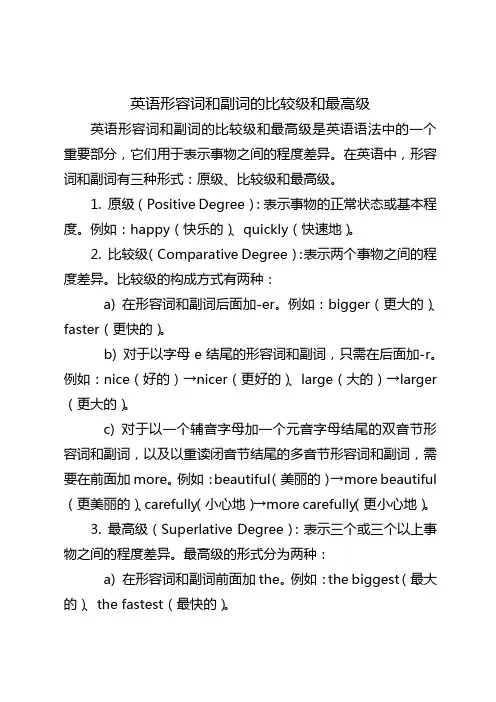
英语形容词和副词的比较级和最高级英语形容词和副词的比较级和最高级是英语语法中的一个重要部分,它们用于表示事物之间的程度差异。
在英语中,形容词和副词有三种形式:原级、比较级和最高级。
1. 原级(Positive Degree):表示事物的正常状态或基本程度。
例如:happy(快乐的)、quickly(快速地)。
2. 比较级(Comparative Degree):表示两个事物之间的程度差异。
比较级的构成方式有两种:a) 在形容词和副词后面加-er。
例如:bigger(更大的)、faster(更快的)。
b) 对于以字母e结尾的形容词和副词,只需在后面加-r。
例如:nice(好的)→nicer(更好的)、large(大的)→larger (更大的)。
c) 对于以一个辅音字母加一个元音字母结尾的双音节形容词和副词,以及以重读闭音节结尾的多音节形容词和副词,需要在前面加more。
例如:beautiful(美丽的)→more beautiful (更美丽的)、carefully(小心地)→more carefully(更小心地)。
3. 最高级(Superlative Degree):表示三个或三个以上事物之间的程度差异。
最高级的形式分为两种:a) 在形容词和副词前面加the。
例如:the biggest(最大的)、the fastest(最快的)。
b) 对于不规则变化的形容词和副词,需要单独记忆其最高级形式。
例如:good(好的)→the best(最好的)、bad(坏的)→the worst(最坏的)。
在使用比较级和最高级时,需要注意以下几点:1. 当比较的对象是同一类事物时,可以使用比较级或最高级。
例如:My car is faster than yours.(我的车比你的车快。
)2. 当比较的对象不是同一类事物时,不能使用比较级或最高级。
例如:My car is faster than a bicycle.(我的车比自行车快。
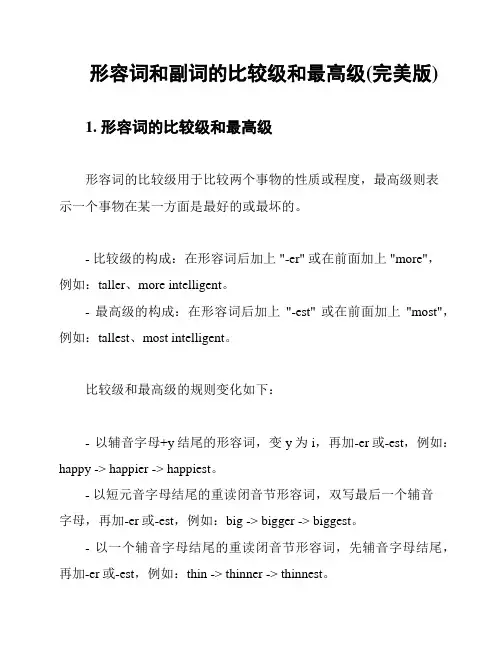
形容词和副词的比较级和最高级(完美版)1. 形容词的比较级和最高级形容词的比较级用于比较两个事物的性质或程度,最高级则表示一个事物在某一方面是最好的或最坏的。
- 比较级的构成:在形容词后加上 "-er" 或在前面加上 "more",例如:taller、more intelligent。
- 最高级的构成:在形容词后加上"-est" 或在前面加上"most",例如:tallest、most intelligent。
比较级和最高级的规则变化如下:- 以辅音字母+y结尾的形容词,变y为i,再加-er或-est,例如:happy -> happier -> happiest。
- 以短元音字母结尾的重读闭音节形容词,双写最后一个辅音字母,再加-er或-est,例如:big -> bigger -> biggest。
- 以一个辅音字母结尾的重读闭音节形容词,先辅音字母结尾,再加-er或-est,例如:thin -> thinner -> thinnest。
- 多音节和部分双音节形容词前加more或most,例如:beautiful -> more beautiful -> most beautiful。
2. 副词的比较级和最高级副词的比较级和最高级的构成方式与形容词类似,只是在形容词的基础上加上 "-ly" 构成副词。
- 比较级的构成:在副词后加上 "-er" 或在前面加上 "more",例如:faster、more quickly。
- 最高级的构成:在副词后加上 "-est" 或在前面加上 "most",例如:fastest、most quickly。
与形容词类似,副词的规则变化也遵循相同的规律。
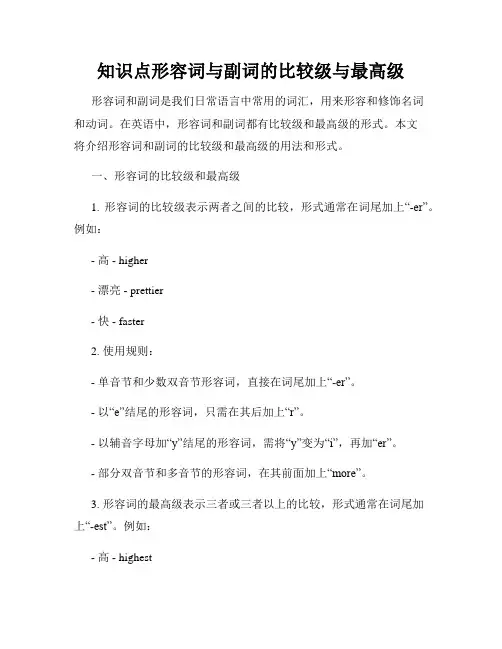
知识点形容词与副词的比较级与最高级形容词和副词是我们日常语言中常用的词汇,用来形容和修饰名词和动词。
在英语中,形容词和副词都有比较级和最高级的形式。
本文将介绍形容词和副词的比较级和最高级的用法和形式。
一、形容词的比较级和最高级1. 形容词的比较级表示两者之间的比较,形式通常在词尾加上“-er”。
例如:- 高 - higher- 漂亮 - prettier- 快 - faster2. 使用规则:- 单音节和少数双音节形容词,直接在词尾加上“-er”。
- 以“e”结尾的形容词,只需在其后加上“r”。
- 以辅音字母加“y”结尾的形容词,需将“y”变为“i”,再加“er”。
- 部分双音节和多音节的形容词,在其前面加上“more”。
3. 形容词的最高级表示三者或三者以上的比较,形式通常在词尾加上“-est”。
例如:- 高 - highest- 漂亮 - prettiest- 快 - fastest4. 使用规则:- 单音节和少数双音节形容词,直接在词尾加上“-est”。
- 以“e”结尾的形容词,只需在其后加上“st”。
- 以辅音字母加“y”结尾的形容词,需将“y”变为“i”,再加“est”。
- 部分双音节和多音节的形容词,在其前面加上“most”。
二、副词的比较级和最高级1. 副词的比较级和最高级形式和形容词一样,通常在词尾加上“-er”和“-est”。
例如:- 快速地 - faster- 温柔地 - more gently- 慢慢地 - slowest2. 使用规则:- 大多数副词直接在词尾加上“-er”和“-est”。
- 部分副词要在其前面加上“more”和“most”。
三、形容词和副词的用法比较1. 形容词的比较级和最高级用法:- 比较级用于两者之间的比较,表示一个事物相对于另一个更高或更低。
- 最高级用于三者或三者以上的比较,表示一个事物在众多事物中最高或最低。
2. 副词的比较级和最高级用法:- 比较级用于两个动作之间的比较,表示一个动作比另一个动作更高或更低。
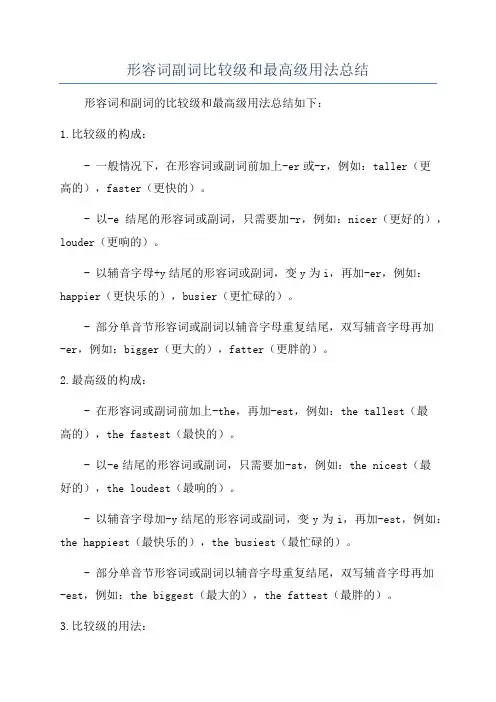
形容词副词比较级和最高级用法总结形容词和副词的比较级和最高级用法总结如下:1.比较级的构成:- 一般情况下,在形容词或副词前加上-er或-r,例如:taller(更高的),faster(更快的)。
- 以-e结尾的形容词或副词,只需要加-r,例如:nicer(更好的),louder(更响的)。
- 以辅音字母+y结尾的形容词或副词,变y为i,再加-er,例如:happier(更快乐的),busier(更忙碌的)。
- 部分单音节形容词或副词以辅音字母重复结尾,双写辅音字母再加-er,例如:bigger(更大的),fatter(更胖的)。
2.最高级的构成:- 在形容词或副词前加上-the,再加-est,例如:the tallest(最高的),the fastest(最快的)。
- 以-e结尾的形容词或副词,只需要加-st,例如:the nicest(最好的),the loudest(最响的)。
- 以辅音字母加-y结尾的形容词或副词,变y为i,再加-est,例如:the happiest(最快乐的),the busiest(最忙碌的)。
- 部分单音节形容词或副词以辅音字母重复结尾,双写辅音字母再加-est,例如:the biggest(最大的),the fattest(最胖的)。
3.比较级的用法:- 表示两个人或物之间的比较,例如:He is taller than me.(他比我高。
- 表示一些人或物在其中一方面的进步或退步,例如:She is getting smarter.(她越来越聪明)。
4.最高级的用法:- 表示三个或三个以上人或物之间的比较,例如:He is the tallest in the class.(他是班级里最高的)。
- 表示人或物在其中一方面的最高水平或程度,例如:She is the smartest student in the school.(她是学校里最聪明的学生)。
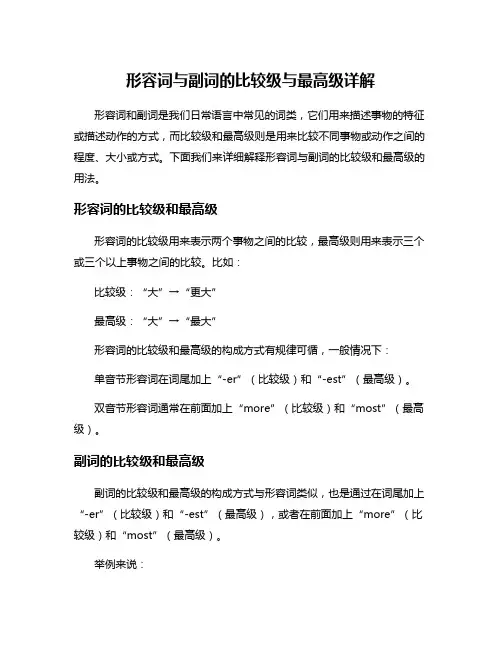
形容词与副词的比较级与最高级详解
形容词和副词是我们日常语言中常见的词类,它们用来描述事物的特征或描述动作的方式,而比较级和最高级则是用来比较不同事物或动作之间的程度、大小或方式。
下面我们来详细解释形容词与副词的比较级和最高级的用法。
形容词的比较级和最高级
形容词的比较级用来表示两个事物之间的比较,最高级则用来表示三个或三个以上事物之间的比较。
比如:
比较级:“大”→“更大”
最高级:“大”→“最大”
形容词的比较级和最高级的构成方式有规律可循,一般情况下:
单音节形容词在词尾加上“-er”(比较级)和“-est”(最高级)。
双音节形容词通常在前面加上“more”(比较级)和“most”(最高级)。
副词的比较级和最高级
副词的比较级和最高级的构成方式与形容词类似,也是通过在词尾加上“-er”(比较级)和“-est”(最高级),或者在前面加上“more”(比较级)和“most”(最高级)。
举例来说:
比较级:“快速”→“更快速”
最高级:“快速”→“最快速”
特殊情况
在一些特殊情况下,比较级和最高级的构成可能会有变化,需要具体根据单词的形态来判断。
形容词和副词的比较级与最高级在英语中是非常常见的用法,掌握好它们的构成规律可以帮助我们更准确地描述事物之间的差异和程度。
通过不断的练习和应用,我们可以更加流利地运用比较级和最高级,使语言表达更加生动、准确。
形容词和副词的比较级与最高级是英语语言中重要的语法概念,掌握好这些规则可以帮助我们更清晰地表达描述,提升语言表达能力。

形容词和副词的比较级和最高级(完美版)一、形容词和副词的比较级和最高级的变化方法如下:1) 符合规则的情况:一般情况:直接加-er;-est以e结尾的词:加-r;-st以“辅音+y”结尾的词:变y为i再加-er;-est以一个辅音字母结尾的词:辅音字母双写,再加-er;-est例词:all-taller-tallest,nice-nicer-nicest,dry-drier-driest,heavy-heavier-heaviest,XXX-XXX-XXX2) 几个不规则的形容词和副词的比较级和最高级如下表:原级:good。
well;bad。
ill;many。
much;little;far二、形容词和副词比较级的用法:级别比较程度肯定表达方式和意义例句(备注)原级同等程度 As+原级+as (像……一样) XXX。
not + so (as) +原级+as (不如……那样) English is not so difficult as science。
比较级不同程度 (用于两者比较) 比较级+than (比……) XXX XXX。
比较级前面可以加much。
far。
even。
still。
a lot。
a little。
a bit等程度加深 I like pork better than beef。
最高级同一范围内的最高程度 The +比较级,the +比较级(越……,越……) XXX gets。
the XXX.The XXX reads。
the better their XXX。
This is because reading can XXX.The highest degree of something is expressed using the superlative form。
which is used for three or more things。
Forexample。
"Spring is the best season of the year." Another example is "Lin Tao jumped the farthest of all."When using the superlative form with an adverb。
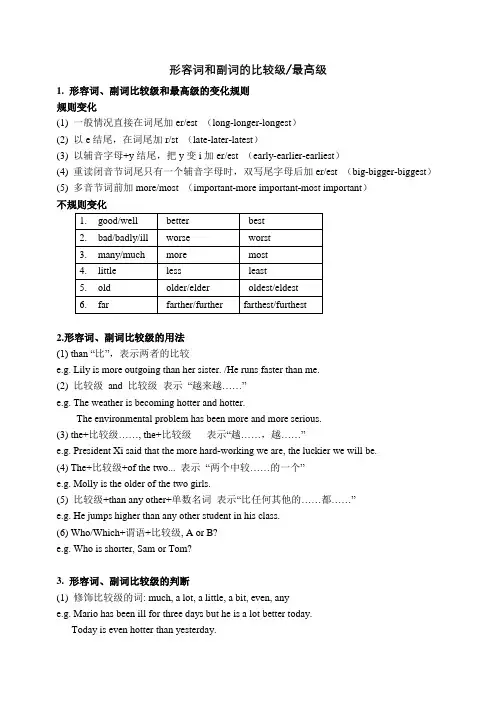
形容词和副词的比较级/最高级1. 形容词、副词比较级和最高级的变化规则规则变化(1) 一般情况直接在词尾加er/est (long-longer-longest)(2) 以e结尾,在词尾加r/st (late-later-latest)(3) 以辅音字母+y结尾,把y变i加er/est (early-earlier-earliest)(4) 重读闭音节词尾只有一个辅音字母时,双写尾字母后加er/est (big-bigger-biggest)(5) 多音节词前加more/most (important-more important-most important)不规则变化2.形容词、副词比较级的用法(1) than “比”,表示两者的比较e.g. Lily is more outgoing than her sister. /He runs faster than me.(2) 比较级and 比较级表示“越来越……”e.g. The weather is becoming hotter and hotter.The environmental problem has been more and more serious.(3) the+比较级……, the+比较级表示“越……,越……”e.g. President Xi said that the more hard-working we are, the luckier we will be.(4) The+比较级+of the two... 表示“两个中较……的一个”e.g. Molly is the older of the two girls.(5) 比较级+than any other+单数名词表示“比任何其他的……都……”e.g. He jumps higher than any other student in his class.(6) Who/Which+谓语+比较级, A or B?e.g. Who is shorter, Sam or Tom?3. 形容词、副词比较级的判断(1) 修饰比较级的词: much, a lot, a little, a bit, even, anye.g. Mario has been ill for three days but he is a lot better today.Today is even hotter than yesterday.(2) 暗含比较级的标志词: be, become, grow, get, makee.g. Computers make our life easier.The weather is becoming colder and colder.4. 形容词、副词最高级的用法(1) 主语+be+the+形容词最高级+in/of/among短语;表示“……是……中最……的……”e.g. My mother is the busiest one in my family.(2) 主语+实义动词(+the)+副词最高级+in/of/among短语;表示“……在……中最……”e.g. Tom works hardest in his class.(3) 主语+be+one of the+形容词最高级+可数名词复数+in/of/among短语;表示“……是……中最……的……之一”e.g. Miss Zhao is one of the most popular teachers in our school.(4) 疑问词+be+the+形容词最高级, A, B, or C? 表示“A,B,C三者中谁最……?”e.g. Who is the tallest, Tom, Sam or Peter?(5) 疑问词+助动词+主语+动词原形(+the)+副词最高级;表示“A,B,C三者中谁……地最……?”e.g. Who jumps the highest, Tom, Sam or Peter?(6) 主语+be+the+序数词+形容词最高级+可数名词单数+in/of/among短语;表示“……是……中第几最……的……”e.g. The Yellow River is the second longest river in China.(7) 主语+be+than any other+可数名词单数= 主语+be+than the other+可数名词复数;表示“比其他任何都……”e.g. The apple is bigger than any other apple on the plate. = The apple is bigger than the other apples on the plate5. 形容词、副词最高级的判断(1) 表示最高级范围的词:in/among/ofe.g. Tony is the tallest of the three boys.(2) 最高级标志词:the(3) 最高级修饰词:形容词性物主代词;序数词e.g. Lily is the second youngest in her class.Ⅱ. 同级比较的用法1. 肯定形式:as+形容词/副词原级+as 表示“和……一样……”e.g. It is reported that Fuxing high-speed train can go as fast as 350 km an hour.2. 否定形式:not as/so+形容词/副词原级+as 表示“不如……”e.g. This movie is not as interesting as that one.【过关检测】1. Who does homework ________ (careful) in your class?2. Who do you think is ________ (funny), Mr. Smith, Mr. Black or Mr. White?3. Anna plays the piano ________ (well) than Susan. And Sally plays it the ________ (well).4. He is one of the _________ (friendly) people in the shopping center.5. Tom is the second ________ (tall) student in his class.6. ______, English, math or Chinese?A. Which do you likeB. What do you like betterC. Which do you like best better7. ---Did Kate do best in the final exam?---No, but of all the students she did ______.A. the most carefulB. carefully enoughC. the most carefully8. ---Which country has the ________ population in the world?---China. It’s a little ________ than that of India.A. most; moreB. biggest; biggerC. bigger; biggest9. ---Tony is only shorter than Jim, right?---Yes, he is ________ student in his class.A. the second tallestB. the two tallestC. second tallest10. ---Tom, what do you think of the school?---Oh, no other school is ________ in the city. It’s ________ one.A. better; a betterB. the best; the bestC. better; the best【课后训练】I. 写出下列单词的比较级和最高级形式Ⅱ. 语法练习1.This story is very ________ (interesting), but that story is ________ (interesting) than this one.2. Nothing is ________ (enjoyable) than playing basketball.3. The yellow bag is the ________ (expensive) of the two bags.4. Which one is ________ (exciting), dog or cat?5. My pocket money is much ________ (much) than yours.6. He felt bad yesterday. But now he feels a lot ________ (good).7. Li Lei draws ________ (badly) than Jim.8. Alice is ________ one of the twins.A. the tallerB. tallerC. tallest9. ________ the mountain is, ________ the air is.B. Higher; thinnerC. The higher; the thinnerA. The highest; thethinnest10. Jack runs ________ than any other student in his school.A. quickB. quicklyC. more quickly。
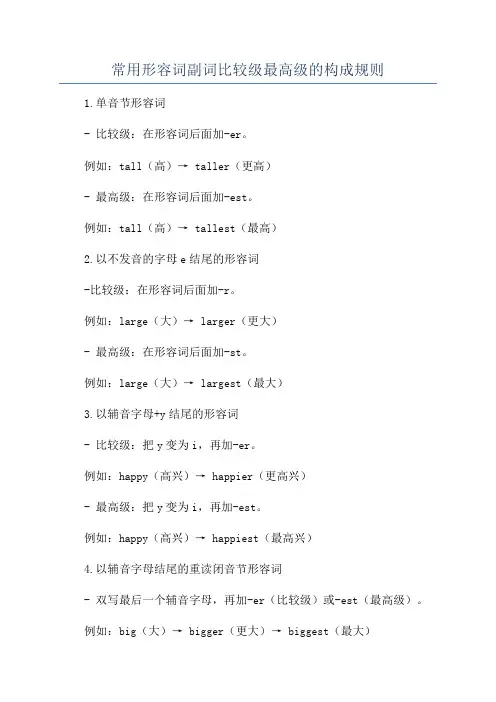
常用形容词副词比较级最高级的构成规则1.单音节形容词- 比较级:在形容词后面加-er。
例如:tall(高)→ taller(更高)- 最高级:在形容词后面加-est。
例如:tall(高)→ tallest(最高)2.以不发音的字母e结尾的形容词-比较级:在形容词后面加-r。
例如:large(大)→ larger(更大)- 最高级:在形容词后面加-st。
例如:large(大)→ largest(最大)3.以辅音字母+y结尾的形容词- 比较级:把y变为i,再加-er。
例如:happy(高兴)→ happier(更高兴)- 最高级:把y变为i,再加-est。
例如:happy(高兴)→ happiest(最高兴)4.以辅音字母结尾的重读闭音节形容词- 双写最后一个辅音字母,再加-er(比较级)或-est(最高级)。
例如:big(大)→ bigger(更大)→ biggest(最大)5.重读闭音节形容词以一个辅音字母加一个元音字母结尾- 比较级和最高级在形容词后面加-er(比较级)或-est(最高级)。
例如:tiny(小)→ tinier(更小)→ tinie st(最小)6.以多音节形容词- 在形容词前面加more(比较级)或most(最高级)。
例如:beautiful(美丽)→ more beautiful(更美丽)→ most beautiful(最美丽)常用副词的比较级和最高级的构成规则与形容词相同:1. 单音节副词:在副词后面加-er(比较级)或-est(最高级)。
2. 以不发音的字母e结尾的副词:在副词后面加-r(比较级)或-st (最高级)。
3. 以辅音字母+y结尾的副词:把y变为i,再加-er(比较级)或-est(最高级)。
4. 以辅音字母结尾的重读闭音节副词:双写最后一个辅音字母,再加-er(比较级)或-est(最高级)。
5. 重读闭音节副词以一个辅音字母加一个元音字母结尾:在副词后面加-er(比较级)或-est(最高级)。
形容词和副词的比较级与最高级形容词和副词的比较级与最高级是语法中基本的知识点之一,它用于比较事物之间的差异和层次。
在英语中,我们使用不同的后缀和规则来构成比较级和最高级。
本文将介绍形容词和副词比较级与最高级的相关规则和用法。
一、形容词的比较级与最高级1. 形容词的比较级形容词的比较级用于比较两个事物之间的差异,表示其中一个事物具有更高或更低的程度。
1)规则变化:单音节或少数双音节形容词在词尾加-er构成比较级,如:tall(高)→ taller(更高);clever(聪明)→ cleverer(更聪明)。
部分双音节和多音节形容词在前面加more构成比较级,如:careful(小心的)→ more careful(更小心的);beautiful(美丽的)→ more beautiful(更美丽的)。
2)特殊变化:a. 以“e”结尾的形容词,在词尾加-r,如:large(大)→ larger(更大);safe(安全的)→ safer(更安全的)。
b. 以“辅音字母+y”结尾的形容词,变“y”为“i”,再加-er,如:happy(高兴的)→ happier(更高兴的)。
c. 部分以“辅音字母+元音字母+辅音字母”结尾的形容词,双写最后一个辅音字母,再加-er,如:big(大)→ bigger(更大)。
2. 形容词的最高级形容词的最高级用于比较三个或三个以上事物之间的差异,表示其中一个事物具有最高或最低的程度。
1)规则变化:在比较级的基础上,加上最前面加the,再加上-est构成最高级,如:tall(高)→ the tallest(最高的);clever(聪明)→ the cleverest(最聪明的)。
部分双音节和多音节形容词在前面加the most构成最高级,如:careful(小心的)→ the most careful(最小心的);beautiful(美丽的)→ the most beautiful(最美丽的)。
形容词副词的比较级和最高级总结比较级和最高级是用来表示两个或多个事物之间的比较关系的形容词或副词的形式。
下面是比较级和最高级的总结:1.形容词比较级和最高级的构成:- 一般情况下,在形容词前加er或est来构成比较级和最高级。
例如:taller(更高的)、tallest(最高的)。
- 对于以辅音字母+y结尾的形容词,将y改为i再加er或est。
例如:happier(更快乐的)、happiest(最快乐的)。
- 对于以“重音音节是辅音字母+元音字母+辅音字母”结尾的单音节形容词,双写最后一个辅音字母再加er或est。
例如:bigger(更大的)、biggest(最大的)。
- 不规则变化的形容词比较级和最高级需要记忆。
例如:good(好的)、better(更好的)、best(最好的)。
2.副词比较级和最高级的构成:- 大多数副词在后面加er或est来构成比较级和最高级。
例如:faster(更快地)、fastest(最快地)。
- 对于以辅音字母+y结尾的副词,将y改为i再加er或est。
例如:happier(更快乐地)、happiest(最快乐地)。
- 不规则变化的副词比较级和最高级需要记忆。
例如:well(好地)、better(更好地)、best(最好地)。
3.使用比较级和最高级进行比较时的用法:- 比较级用于比较两个事物。
例如:She is taller than her sister.(她比她妹妹高。
)- 最高级用于比较三个或三个以上事物。
例如:He is the tallest boy in the class.(他是班上最高的男孩。
)- 当比较的对象是不可数名词时,使用more或most来构成比较级和最高级。
例如:She has more money than him.(她比他有更多的钱。
形容词和副词的比较级和最高级形容词和副词的比较级和最高级的用法是初二上册新教材的重要考点,同时也是中考必须掌握的重要内容。
本文主要从形容词副词比较等级的变化、用法、及易错点三大方面对相关知识点进行详细解析,希望对同学们有所帮助。
一. 形容词和副词的比较级和最高级的变化方法如下:(1) 规则变化表:(2)几个不规则的形容词和副词的比较级和最高级如下表:二.形容词和副词比较级的基本用法注:如果动词是及物或不及物动词,则后面用副词;如果后面是连系动词,则后面用形容词。
如:This car is the fastest of the four.(形容词)(这辆汽车是四辆之中最快的)This car runs (the) fastest of the four.(副词)(这辆汽车是四辆之中跑得最快的)三.形容词副词比较级最高级的特殊用法(1)和冠词连用the +形容词原级+v(复),指一类人或物the +形容词比较级,指两者中“较…的”的那一个,eg. the younger of the twoa/ an +形容词比较级eg. The pen is expensive. I want a cheaper one.( a) +most+形容词最高级“非常…”eg. a most beautiful city(2)序数词及最高级连用,如:Flying is the fastest and the second cheapest way to travel.(3)比较级+than any other +n. (单)(适用于范围一致时)(all) other +n.(复)any +n.(单) (适用于范围不一致时) He is taller than any other student / all other students in his class.any student in my class.(4)倍数表达法。
形容词和副词的比较级和最高级形式形容词和副词的比较级和最高级形式是英语语法中一项重要的知识点。
掌握了这些形式,我们就能够更准确地描述事物的特点、比较不同事物之间的差异,并且能够提升我们的表达能力。
本文将对形容词和副词的比较级和最高级形式进行详细介绍,并提供一些相关的例句。
一、形容词的比较级和最高级形式1. 比较级形式形容词的比较级形式用于比较两个事物之间的差异,表达一物在某方面较另一物更高、更远、更大、更好等。
比较级形式的构成方式有以下几种(取决于形容词的词尾变化):a) 一般情况下,直接在形容词后面加上“-er”,如:taller(更高的)、bigger(更大的)等。
例句:- She is taller than her sister.(她比她的姐姐高。
)- This book is more interesting than that one.(这本书比那本书更有趣。
)b) 以“辅音字母+y”结尾的形容词,要变“y”为“i”,再加上“-er”,如:happier(更快乐的)、funnier(更有趣的)等。
例句:- The weather today is sunnier than yesterday.(今天的天气比昨天更阳光明媚。
)- The movie we saw last night was scarier than we expected.(我们昨晚看的电影比我们预想的要吓人。
)c) 以重读闭音节结尾的形容词,要双写最后一个辅音字母,再加上“-er”,如:bigger(更大的)、darker(更暗的)等。
例句:- The baby's eyes are bigger than her hands.(婴儿的眼睛比她的手大。
)- The room becomes darker as the night falls.(晚上降临时,房间变得更黑暗。
)2. 最高级形式形容词的最高级形式用于在三个或三个以上事物之间进行比较,表达最高级的程度,即某物在某方面最高、最远、最大、最好等。
英语中常见的形容词和副词的比较级和最高级英语中的比较级和最高级是用来表示事物之间的比较关系的重要语法结构。
通过使用比较级和最高级,我们可以更准确地描述事物的程度、大小、速度等。
下面我们将探讨一些常见的形容词和副词的比较级和最高级。
一、形容词的比较级和最高级1. 比较级的构成形容词的比较级通常是在词尾加上-er,例如:big(大)-bigger(更大),fast (快)-faster(更快)。
但是也有一些形容词的比较级是通过在前面加上more来构成的,例如:beautiful(美丽)-more beautiful(更美丽)。
2. 最高级的构成形容词的最高级通常是在词尾加上-est,例如:biggest(最大的),fastest(最快的)。
同样地,一些形容词的最高级是通过在前面加上most来构成的,例如:most beautiful(最美丽的)。
3. 不规则变化有一些形容词的比较级和最高级是不规则的,需要记忆。
例如:good(好)-better(更好)-best(最好),bad(坏)-worse(更坏)-worst(最坏)。
二、副词的比较级和最高级1. 比较级的构成副词的比较级通常是在词尾加上-er,例如:quickly(快速地)-quicker(更快地)。
另外,一些副词的比较级是通过在前面加上more来构成的,例如:carefully(小心地)-more carefully(更小心地)。
2. 最高级的构成副词的最高级通常是在词尾加上-est,例如:quickly(快速地)-quickest(最快地)。
同样地,一些副词的最高级是通过在前面加上most来构成的,例如:carefully(小心地)-most carefully(最小心地)。
3. 不规则变化有一些副词的比较级和最高级是不规则的,需要记忆。
例如:well(好)-better(更好)-best(最好),badly(糟糕地)-worse(更糟糕地)-worst(最糟糕地)。
形容词与副词的比较级和最高级
形容词和副词在比较级和最高级方面有不同的形式。
下面是它们的比较级和最高级形式的规则:
1. 单音节词或少数双音节词的比较级和最高级:
- 比较级:在形容词或副词前加上 "-er"。
- 最高级:在形容词或副词前加上 "-est"。
例如:
- 比较级:big(大)→ bigger(更大)
- 最高级:big(大)→ biggest(最大)
2. 以字母 "e" 结尾的单音节词或少数双音节词的比较级和最高级:
- 比较级:在形容词或副词前加上 "-r"。
- 最高级:在形容词或副词前加上 "-st"。
例如:
- 比较级:nice(好)→ nicer(更好)
- 最高级:nice(好)→ nicest(最好)
3. 多音节词和部分双音节词的比较级和最高级:
- 比较级:在形容词或副词前加上 "more"。
- 最高级:在形容词或副词前加上 "most"。
例如:
- 比较级:beautiful(美丽的)→ more beautiful(更美丽的)
- 最高级:beautiful(美丽的)→ most beautiful(最美丽的)
需要注意的是,有一些形容词和副词的比较级和最高级形式是不规则的,需要
单独记忆。
例如:
- good(好)→ better(更好)→ best(最好)
- bad(坏)→ worse(更坏)→ worst(最坏)
希望以上解答对你有所帮助。
如果你有其他问题,请随时提问。
形容词副词的比较级和高级————————————————————————————————作者:————————————————————————————————日期:形容词和副词一形容词、副语的句法功能形容词和副词都是起修饰作用的词。
它们各自的功能如下:词类功能例句形容词定语Han Mei is a beautiful girl.表语The meal is very delicious.宾语补足语We must keep the classroom clean.副词状语Bill gets up late on weekends. 后置定语Life here is rich and interesting. 表语Class is over.二形容词的排列顺序不少学生对如何排列形容词的词序颇感困惑。
在此,我们向同学们介绍一个简易的记忆方法。
请你记住“限观形龄色国材”,如果这几个字不好记,你就记“县官行令谢国财”。
口诀说明例词县(限)代表限定词,包括冠词、指示代词、形容词性物主代词、名词所有格、数词等。
the,this,that,my,Tom's,two官(观)代表观点的描述性形容词。
fine,beautiful,interesting行(形)代表表示大小、长短、高低及形状的形容词。
small,tall,high,round令(龄)代表年龄、新旧的形容词。
young,old,new 谢(色)代表颜色的形容词。
red,black,white国代表国籍、地区、出处的形容词(或名词)。
English,American,Japan财(材)代表中心名词构成材料的形容词。
wooden,stone,plasticThere is a fine old _______ bridge near the village.村子附近有一座漂亮的古代石桥。
I bought a ______ blue plastic pencil box yesterday.昨天我买了一个便宜的蓝色塑料铅笔盒。
They have got such a ______ brown wooden table.他们有一张褐色的木制圆桌。
三形容词变副词的方法1.大多数形容词在词尾加-_______。
careful—carefully,quick—quickly,bright—brightly2.以“辅音字母+y”结尾的形容词,把y变成_____,再加-ly。
easy—easily,happy—happily,lucky—luckily3.以“元音字母+e”结尾的形容词,去_____再加-ly。
true—truly4.以le结尾的形容词,去e再加-_____。
terrible—terribly,simple—simply,possible—possibly四形容词、副词的比较等级1.形容词和副词的比较级和最高级的概念和构成:英语中的形容词和副词常用三种形式来表达事物的等级差别,分别是原级、比较级和最高级。
大部分形容词和副词的比较级和最高级是在词尾加-er/-est或在词前加more/most,属于规则变化,但也有少数是不规则的变化。
(1)规则变化情况构成方式原级比较级最高级一般情况加-er或-est oldfastolderfasteroldestfastest以e结尾的词加-r或-st late later latest以“辅音+y”结尾的双音节词变y为____,再加-er或-estearlyhappyearlierhappierearliesthappiest多音节词和部分双音节词在其前面加more或mostusefulcarefullymore usefulmore carefullymost usefulmost carefully重读闭音节的词末尾只有一个辅音字母先双写______字母,再加-er或-estbighotthinfatbiggerhotterthinnerfatterbiggesthottest thinnestfattest(2)不规则变化原级比较级最高级good/well better _______ill/bad/badly worse ______many/much more ______ little less ______far fartherfurtherfarthestfurthestold older/elder oldest/eldest 2.形容词/副词比较等级的基本用法级用法比较级A和B两者相比较结构例句A>B①A+谓语+比较级+than+B②Who/Which+谓语+比较级,A or B?Tom is _____ than Bill.汤姆比比尔高。
Which do you like better,apples or pears?苹果和梨你更喜欢哪一种?A=BA+谓语+as+形容词/副词原级+as+BTom runs as ______ as Jim.汤姆跑得和吉姆一样快。
A<B①A+(否定)谓语+比较级+than+B②A+(否定)谓语+as/so+原级+as+B③A+谓语+less+原级+than+BAlice ______ older than Ann.艾丽斯不如安大。
Bob isn't as _____ as Nick.鲍勃不如尼克高。
An n is ______ beautiful thanLucy.安不如露西漂亮。
最高级表示三者或三者以上的比较,表示其中一个在某一方面超过其他几个。
后面用in或of短语来说明比较的范①Who+be+the+形容词的最高级,A、B or C?②Which+be+t he+形容词的最高级,A、B or C?③A+谓语+the+形容词/副词的最高级+表示范围的短语(of/in...)Who is the_______,Tom,Bill or Jim?汤姆、比尔、吉姆谁最高?Bob is the shortest______ hisclass.鲍勃在他的班里最矮。
围。
3.形容词和副词比较级的特殊用法(1)比较级的特殊用法①比较级+and+比较级“越来越……”(“more+原级”构成的比较级用more and more+原级)China is becoming ______________________中国正变得越来越强大。
②the+比较级...,the+比较级...,“越……,就越……”The___________ we do for the people,the ____________we'll be.我们为人民做得越多,我们就越幸福。
③句中如果有“of the two”短语时,比较级前加the,表示两个中的一个更/较……Bill is the taller of the two boys.比尔是这两个男孩中较高的那一个。
(2)最高级的特殊用法①...one of+the+形容词的________级+复数名词China is one of the largest countries all over the world.中国是世界上最大的国家之一。
②...the+_________词+形容词的最高级The Yellow River is the second longest river in China.黄河是中国第二长河。
(3)比较级表示最高级含义①...形容词/副词的比较级+than+any other+_______数名词Wang Fang studies better than any other student in her class.王芳比她班上的其他任何一个学生学习都好。
②形容词/副词的比较级+than+the other+_________数名词Wang Fang studies better than the other students in her class.王芳在她班中学习最好。
4.比较级、原级的修饰语(1)当强调比较的程度时,可以在形容词或副词的比较级前使用much,a little,even,still,a lot,far,any,no等。
I t is ____________ hotter today than it was yesterday.今天比昨天热得多。
My apple is __________________smaller than yours.我的苹果比你的小点儿。
Meimei does _____________ worse than Lucy.梅梅做得甚至比露西更糟。
(2)very,quite,too,so常用来修饰原级,不能修饰比较级。
汤姆比我高很多。
()Tom is very taller than me.()Tom is much taller than me.精题精练1.This is _______book in our library.A. the most interestingB. most interestingC. the more interestingD. more interesting2. Nowadays science fiction isn’t as ________ as cartoons among teenagersA. less popularB. more popularC. popularD. the most popular3. Tom failed in the exam. He looked ______.A. happyB. sadlyC. upsetD. lovely4. Yangpu Bridge is one of ______ in the world.A. bigger bridgeB. the biggest bridgeC. the biggest bridgesD. bigger bridges5. 30,000 dollars is a large amount of money, but it’s ______than we need.A. far moreB. very muchC. far lessD. very little6. Mr. Smith thought the Century Park was the second _____ park in Shanghai.A. largeB. largerC. largestD. very large7. The lake looks _____in the moonlight. I often take a walk around it.A. wonderfullyB. famousC. beautifulD. well8. The Russian President paid his first visit to Shaolin Temple last March. He had _______ been there before.A. neverB. oftenC. usuallyD. always9. The woman couldn’t swim ______to reach the bank. She was crying for help.A. good enoughB. enough goodC. well enoughD. enough well10. Jane speaks English______.A. so fluent as JohnB. as fluent as JohnC. more fluent than JohnD. much more fluently than John11. Look at the lovely baby! It’s only ________.A. five months oldB. three monthC. two year oldD. ten-month-old12. I’m shortsighted and I can’t see the words on the notice board______.A. clearB. clearlyC. carefullyD. good13. “I’ve got an A for my history,” Judy said ______.A. sadlyB. sadC. happilyD. happy14. The fat man always says his meat looks ______ and sells _______.A. good, goodB. well, wellC. good, wellD. well, good15. Are you going to leave ______?A. the open windowsB. the windows openingC. the windows openD. the windows opened16. Of all the stars the sun is ______ to us.A. closeB. closerC. closestD. the closest17. I have _______to tell you.A. anything importantB. important somethingC. something importantD. important anything18. Tea becomes _______in the world.A. much more popularB. more and more popularC. more popular and more popularD. popularer and popularer19. She told us______ story that we all forgot about the time.A. such an interestingB. such interesting aC. so an interestingD. a so interesting20. The dog looked ______at me. It looked _______.A. angry, angryB. angrily, angrilyC. angry, angrilyD. angrily, angry21. Go ______, and you’ll find the sheep.A. straightly aheadB. straight aheadC. ahead straightD. ahead straightly22. We decided not to climb the mountains because it was raining ______.A. badlyB. hardlyC. stronglyD. heavily23. ---Can I help you?--- Well, I’m afraid the box is _______ heavy for you, but thank you all the same.A. soB. muchC. veryD. too24. The Yellow River is longer than ______ in Japan.A. any other riverB. other riversC. any riverD. any other rivers25. Sam runs ______ than Peter.A. slowlyB. slowlierC. more slowlyD. much slowly26. --- If you don’t like the red coat, take the blue one.--- OK. But do you have ______ size in blue? This one is a bit tight for me.A. a bigB. a biggerC. the bigD. the bigger27. John plays football ______, if not better than, DavidA. as wellB. as well asC. so wellD. so well as28. Tony is going camping with ______ boys.A. little two otherB. two little otherC. two other littleD. little other two29. Those who have ______ money are not ______.A. much, happierB. more, the happiestC. the most, the happiestD. most, the happier30. The old man lived ______ in the house, but he didn’t feel ______.A. lonely, lonelyB. alone, lonelyC. alone, aloneD. lonely, alone31. The cheese cake tasted so ______ that the kids asked for more.A. deliciousB. wellC. badD. badly32. I like swimming very much .But now I ______ swim as ______ as I used to.A. don’t…oftenB. not...oftenC. don’t…oftenerD. not…oftener33. We felt ______ after we watched the ______ football match.A. exciting….excitedB. excited….excitingC. excited….excitedD. exciting…exciting34. There are ______ books in our school library than in yours.A. many muchB. a lot moreC. a lot of moreD. little more35. Water will be turned into ice in ______ weather.A. freezeB. frozeC. freezingD. frozen.36. The supermarket is ______ from 8 a.m. to 8 p.m. every day.A. openingB. openedC. openD. being opened37. Tsunamis (海啸) travel ______ 500 miles per hour in the deep ocean and cross the entire Pacific Ocean in less than 24 hoursA. more faster thanB. as fast asC. as quick asD. as quicklier as38. It sounds like ______ trip. Could l book tour for five?A. interestingB. an interestingC. interestedD. an interested39. The price of housing states ______ than before.A. is much higherB. are much higherC. is more expensiveD. are more expensive40. Which is ______, cotton, woods or iron?A. heavierB. heaviestC. the heaviestD. the most heavily。